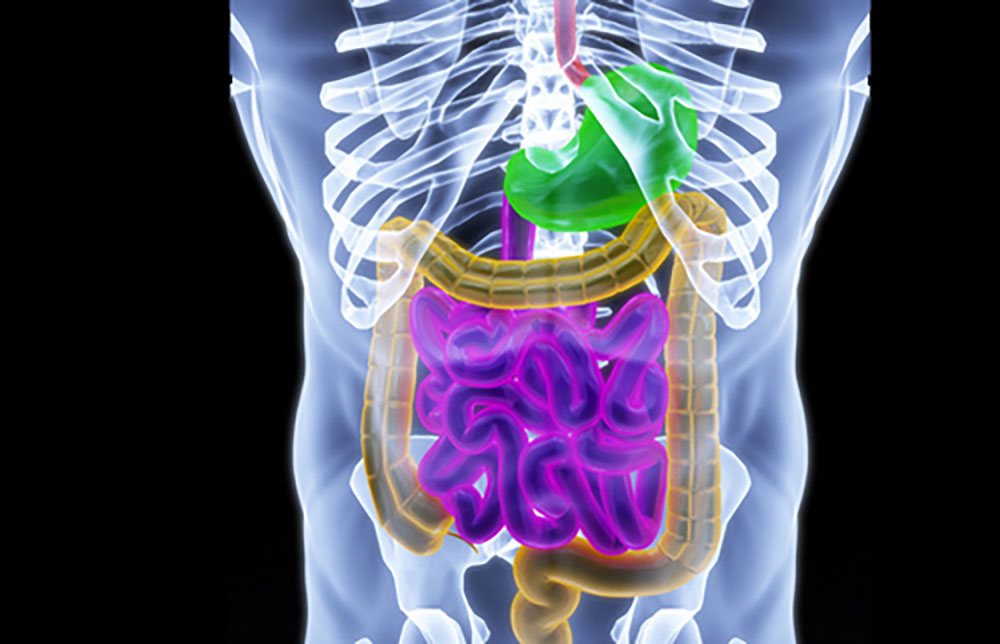The small intestine is responsible for absorbing our dietary nutrients, but it also plays a role in warding off toxic chemicals and life-threatening bacteria. Yale researchers now report on the critical role that the gut’s immune system plays in these key processes. Their studies suggest that the gastrointestinal (GI) immune system not only defends against pathogens, it also regulates which nutrients are taken in. The team’s findings may offer up new insights into origins of metabolic disease and malnutrition that is common in some undeveloped regions of the world.
“We were surprised that the immune system was so involved in nutrition,” said Zuri Sullivan, PhD, a former graduate student in the immunology department at Yale and now a Howard Hughes Medical Institute Hanna H. Gray postdoctoral fellow at Harvard. “And the study lays the groundwork for understanding how this reciprocal interaction works.” Sullivan is first author of the team’s published paper in Science, which is titled, “γδ T cells regulate the intestinal response to nutrient sensing.”
In their research article summary, the authors describe the gastrointestinal tract as “a multikingdom cellular ecosystem” that is effectively in constant contact with the external environment, and which to balance defense, with nutrient uptake. “ … the small intestine is at once a gateway for life-threatening pathogens and toxins and the site of absorption for life-sustaining nutrients,” they wrote. “Consequently, this tissue is tasked with the challenge of balancing its primary functions of nutrient uptake and host defense in response to a complex and constantly changing environment.”
Working in the lab of senior author Ruslan Medzhitov, PhD, Yale’s Sterling Professor of Immunobiology and an investigator at the Howard Hughes Medical Institute, Sullivan became interested in how the diets of humans and other animals can dramatically change the organization of their digestive tracts. For example, the digestive systems of carnivores and herbivores are organized differently to accommodate their specialized diets.
Omnivores have the most complex system, which must adapt to a diverse diet of proteins, fats, and carbohydrates, depending upon what’s available in the environment, and at different times of year. So, as the team noted in the discussions in both their summary, and main papers, “ … specialists have evolved fixed morphologic adaptations in the organization of the GI tract that facilitate efficient nutrient uptake from their restricted diets … By contrast, generalists require dynamic adaptation to the diverse foods that are consumed throughout life … These ongoing changes in diet exist alongside encounters with ingested toxins, enteric pathogens, and commensal microbes.”
Sullivan, Medzhitov, and colleagues decided set out to investigate how the large numbers of immune cells present inside gastrointestinal tracts might influence nutrition. For their studies, the team designed special diets for mice that differed only in the ratio of protein to carbohydrates. They fed these highly controlled diets to groups of the experimental animals, and used techniques including RNA sequencing to evaluate gene expression changes in the animals’ GI tract epithelial cells, and systemic metabolism, in response to these highly controlled diets.
Prior research in the area of intestinal defenses against parasitic and microbial pathogens had shown that interactions between intestinal epithelial cells and lymphocytes—“the largest population of lymphocytes in the body”—coordinate tissue responses to enteric infection. Based on these findings the team hypothesized that regulation of nutrient handling by the cellular machinery in the GI trace may involve cooperation between these tissue-resident lymphocytes and the intestinal epithelial cells. Recent studies on host defenses in the GI tract in addition prompted the team to reason that “cellular remodeling of the intestinal epithelium, which occurs in response to certain infections, may also underlie its adaptation to different nutrients.”
The immune system cytokine interleukin-22 (IL-22), plays a key role in combating bacterial pathogens such as those that cause food poisoning. The presence of IL-22 also seems to prevent the uptake of certain nutrients in the digestive system when pathogens are present. Through their controlled diet experiments in mice the researchers discovered that a specific group of immune system cells—γδ T cells—suppressed expression of interleukin-22 and allowed the cells of the intestinal wall to activate digestive enzymes and nutrient transporters. . “We found that enzymes and transporters required for carbohydrate digestion and absorption were regulated by carbohydrate availability,” the team noted. “The “on-demand” induction of this machinery required γδ T cells, which regulated this program through the suppression of interleukin-22 production by type 3 innate lymphoid cells.” The studies showed that diet changed the transcriptome, tissue localization and behavior of these γδ T cells. ” Our studies have defined a role for γδ T cells in the regulation of epithelial transcriptional response to diet and showed that diet can alter the frequency of epithelial cell subsets,” they authors concluded.
The finding that nutrient uptake can be regulated by lymphocyte control of cytokine production links the regulation of nutrient uptake to the regulation of barrier defense, the authors suggested. “The finding that shared machinery can regulate both of these crucial functions in the small intestine may help explain how this tissue adjusts the balance between defense and nutrient uptake in the face of constant environmental change.” An intriguing question for further investigation, they further noted, is whether nutrient uptake can be regulated by other intestinal lymphocytes and cytokines in response to different environmental signals.
The new research could provide some insights into malnutrition in some parts of the world, where bacterial infections lead to chronic expression of IL-22 and suppress the uptake of nutrients. The results might also eventually help researchers develop ways to combat high rates of metabolic diseases, such as type 2 diabetes and obesity in the developed world, Sullivan said.



